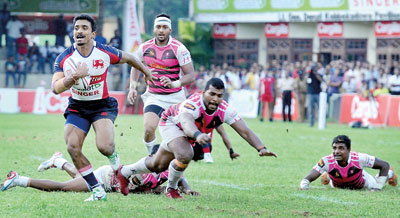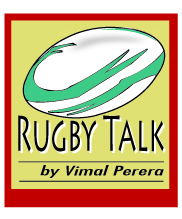Those decisions that change the course of a game
View(s):Decision making is important in rugby as players or referees on the field. Theoretically one may talk of the decision process but the speed at which decisions are made on the field is what matters.
That should lead to a reward for the decision in points. Recently I saw incidents where a quick decision process was practiced. A decision is required because there are alternatives. In a situation involving a player the negative result of a decisionis taken to mean it is a part of the game. Whereas if it is attributed to match officials more often recognized as the referee the insinuations are many leading to labeling as incompetent or that of favouring one against the other? Some are wild allegations.

The Kandy vs Havelocks game ended in a thriller at Nittawela - Pic by Amila Gamage
Let us take an example of the decision taken in the last minute of the Havelock’s- Kandy match which resulted in the Park Club losing the game. The game was almost over and the only thing that waited was the final whistle to confirm that the game was won by a thin margin of 4 points. That is not what happened as Havelocks who were leading won a penalty in their territory and there is a decision to be made. Do you kick the ball to touch and the line out is yours or call for a scrum as this would eat up time. The other option is to work the ball and keep it with you. The player opts to work the ball and then chips into the hand of Kandy who keep the ball in play which allows their player to spot the gap and score and lead by a point and the final whistle goes off. The player took the option that he thought was best probably thinking if I kick the ball out or call for a scrum there still might be time left.
In another scenario the ball is kicked by the Army and passes over the plane of touch and is propelled in by an Army player. CH collect the ball and run to the goal line while the referee runs along probably thinking is there a reason I should not award a try? Was the ball out and should it be a line out. Do you take the propel of the ball as a quick throw in. If so did the ball travel 5 meters or did the reds prevent it travelling 5 meters and another thing that will go on in the officials mind is whether the ball was thrown 5 m by greens if it is a quick throw. All these happen in a couple of seconds. Before awarding the try the official seeks conformation from his Assistant referee to check whether there is any reason why he should not allow the try. The AR explains and no score is awarded and free kick is given to Army. I explain this as a spectator next to me blamed the referee and commented that we cannot win with these referees. I asked him a reason and all he could say is that the ball was played by an  Army player. Even the fact that the Army Player was out of the field was not an issue in his equation.
Army player. Even the fact that the Army Player was out of the field was not an issue in his equation.
Let us take the Navy CR match where one prop of the Navy was tall and the opposite number was shorter. The Navy prop stayed hunched as he went down and collapsed a few times. While this goes on the CR prop goes in to bind in a way more comfortable to him. He also gets penalized as he eases the tight bind. His comfort was the decision he made. On the other hand if he propped as he should the Navy player would have been penalized for collapsing and may have even got sent off for repeated infringement. The easy way was the better way or he was not skilled to do what he should do.
I have also seen a post and share of an article from a broadcast which points to an issue that there were 16 players on the field and leading to build a perception that Sri Lanka has changed the face of rugby numbers on the field. This was not only a post in a website but has been discussed as though the match official committed a heinous crime in that they had sent a player before the other came out. The law is clear on what should be done when an incident of this nature is identified by the referee. The process was not followed and all have to take the blame.
A similar incident happened in 2003 when England admitted that they erred in sending on a 16th man during the 35-22 victory over Samoa. This was a world cup game. The crux of the matter was not so much that England had 16 players on the field but that they willfully ignored the instructions of another touchline official. England was fined £10,000 and their fitness trainer was suspended for two games for the rule breach. In another incident in 2011 England’s Rugby Football Union was forced to suspend two of its coaching staff after an investigation found they smuggled Jonny Wilkinson’s favorite ball on to the pitch during a World Cup match with Romania so he could use it for place-kicks.
Just as much as the match officials are there to do a job the officials too have to take responsibility for acts that are not consistent with the spirit of the game. I could quote a number of related incidents where the rugby judicial reviews have taken the position to punish the team officials who pressure side line and other match officials to err. Law discussions on rugby 365 is an interesting read as you can compare the argument the decision of the referee as well as the comments by the commentators.
Despite an issue that surfaced in the previous week I was surprise to see the coaching staff once gain putting pressure on the substitute management official to send on players before the player on the field comes out. Even with all communication in a world cup a player went in and a ball was substituted but action was taken. If you need a quick player in and have no communication equipment make available a bell to the official desk.
-Vimal Perera is a former Rugby Referee, coach and Accredited Referees Evaluator IRB


